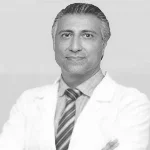
Dr. Amirpasha Ebrahimi is a highly experienced general surgeon and fellowship-trained breast surgeon in Dubai & Tehran with more than […]
Breast cancer is a disease where cells in the breast grow out of control. These cells usually form a tumor that can often be felt as a lump or seen on an X-ray. While it is most common in women, it’s important to remember that men can get breast cancer too, though it is rare.
Breast cancer can begin in different parts of the breast:
Ductal Carcinoma: The most common type. It starts in the tubes (ducts) that carry milk to the nipple.
Lobular Carcinoma: Starts in the glands (lobules) that produce milk.
Finding breast cancer early—before it has spread—is the key to successful treatment and long-term survival. Early-stage breast cancer has a very high cure rate.
Mammograms: An X-ray of the breast. It is the most effective screening tool for finding breast cancer early, sometimes years before a lump can be felt. Women are typically advised to start regular mammograms at age 40 or 50, depending on personal risk factors.
Clinical Breast Exams: A physical examination of the breasts performed by a doctor or nurse.
Breast Self-Awareness: Being familiar with how your breasts normally look and feel so you can report any changes to your doctor right away. This is more about knowing what’s normal for you than following a strict self-exam schedule.
Be aware of these potential warning signs. See a doctor if you notice:
A new lump or mass in the breast or armpit.
Swelling of all or part of a breast (even if no distinct lump is felt).
Skin irritation or dimpling (like the skin of an orange).
Breast or nipple pain.
Nipple retraction (turning inward).
Redness, scaliness, or thickening of the nipple or breast skin.
Nipple discharge (other than breast milk), especially if it’s bloody.
Important: Many of these symptoms can also be caused by benign (non-cancerous) conditions. However, it is essential to get any new or unusual changes checked by a healthcare professional.
Treatment is highly personalized and depends on the type of cancer, its stage (how far it has spread), and the patient’s overall health. A combination of treatments is often used.
Surgery: To remove the tumor. Options include a lumpectomy (removing only the tumor) or a mastectomy (removing the entire breast).
Radiation Therapy: Uses high-energy rays to kill cancer cells in a specific area, often after surgery.
Chemotherapy: Uses powerful drugs to kill cancer cells throughout the body.
Hormone Therapy: Blocks cancer cells from getting the hormones they need to grow. Used for certain types of breast cancer.
Targeted Therapy: Uses drugs that specifically attack cancer cells with certain genetic features, often with fewer side effects than chemo.
Thanks to incredible advances in research, technology, and treatment, the outlook for breast cancer patients has improved dramatically over the past few decades.
Survival rates are higher than ever.
Treatments are more effective and often less invasive.
There is a greater focus on quality of life during and after treatment.
A strong network of support is available for patients and their families.
If you are diagnosed, you are not alone. A whole team of specialists will work with you to create the best possible treatment plan.

Dr. Amirpasha Ebrahimi is a highly experienced general surgeon and fellowship-trained breast surgeon in Dubai & Tehran with more than […]

Dr. Omid Modiramani is a highly experienced medical oncologist and clinical hematologist in Dubai with more than 12 years of […]

Dr. Mohammad Hadizadeh is renowned as the first Iranian surgeon with a specialized fellowship in breast surgery, positioning him as […]

Dr. Seyed Ziaeddin Rasihashemi is an esteemed Associate Professor of Thoracic Surgery at Tabriz University of Medical Sciences in Iran. […]

Dr. Elham Esform is a board-certified OB/GYN and minimally invasive gynecological surgeon in Mashhad, Iran. With specialized training in laparoscopy, hysteroscopy, and endometriosis, she provides […]

Dr. Maryam Mirzaei Moghadam is a highly skilled radiation oncologist in Tehran specializing in chemotherapy, radiotherapy, and advanced cancer treatments. […]

Dr. Helaleh Khoshbakht is a highly respected radiation oncologist in Tehran with extensive expertise in treating various cancers, including breast, […]

Dr. Shiva Moghadam is a highly accomplished radiation oncologist in Tehran, Iran, currently serving as: Academic Board Member at Motamed Jihad University […]

From Personal Experience to Professional Passion Dr. Monir Mirai is a dedicated radiation oncologist in Tehran whose career path was […]

Dr. Hossein Foudazi is a prominent radiation oncologist based in Tehran, Iran, who has a significant role in the field […]

Dr. Sarvazad Sotoudeh is a board-certified radiation oncologist with extensive experience in treating gynecologic cancers using intracavitary and interstitial high-dose-rate (HDR) brachytherapy. With over […]

Dr. Reza Malayeri is a highly respected hematologist and medical oncologist based in Tehran, Iran, with extensive expertise in diagnosing […]